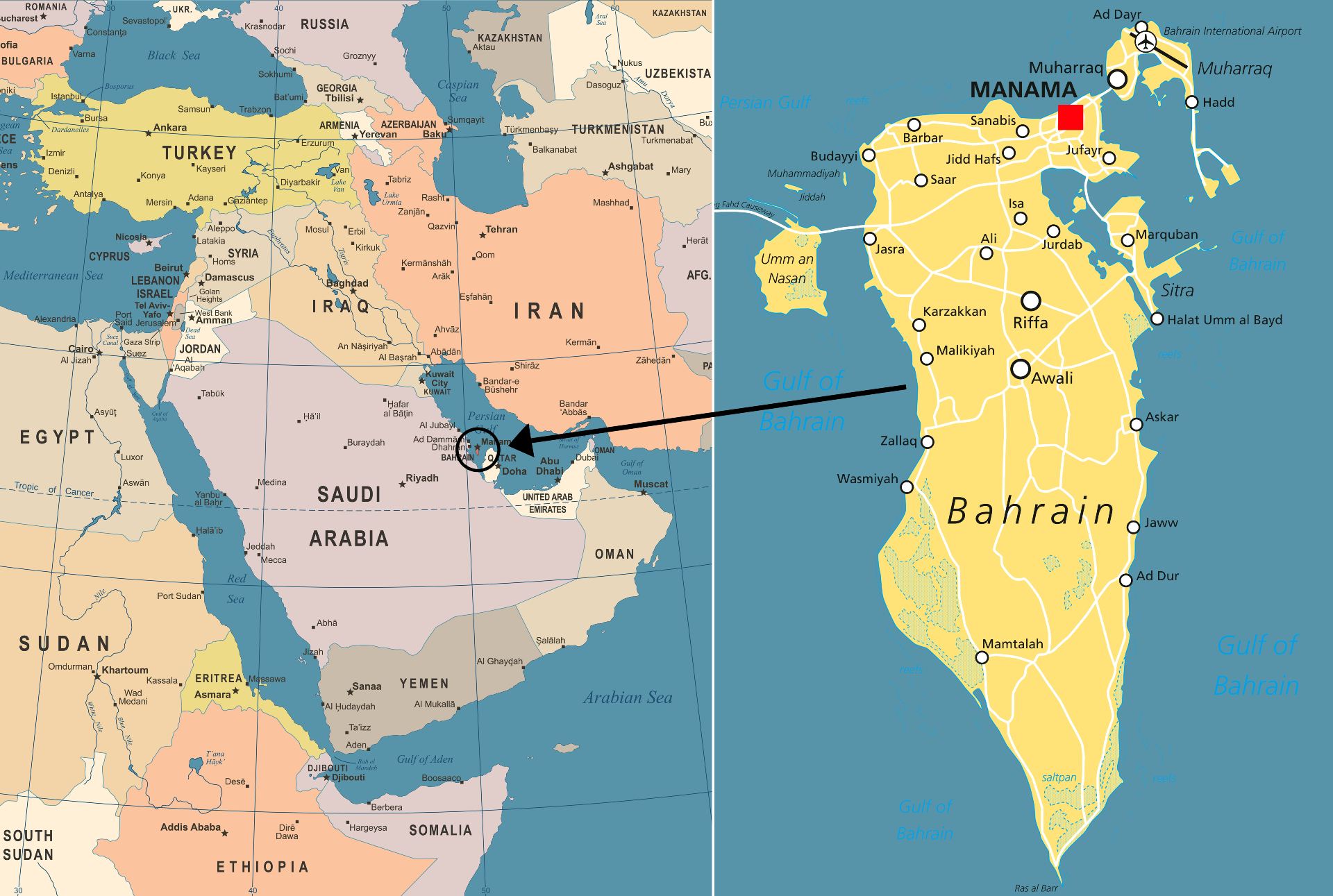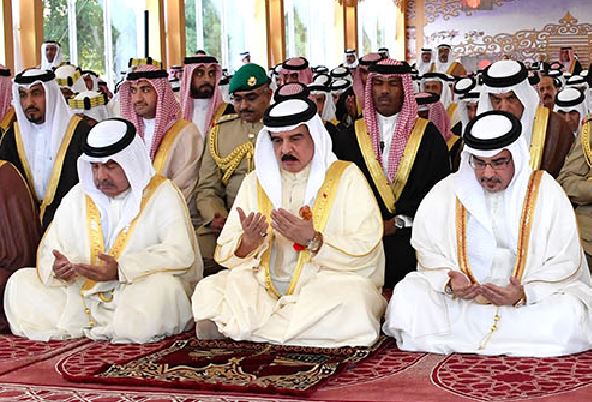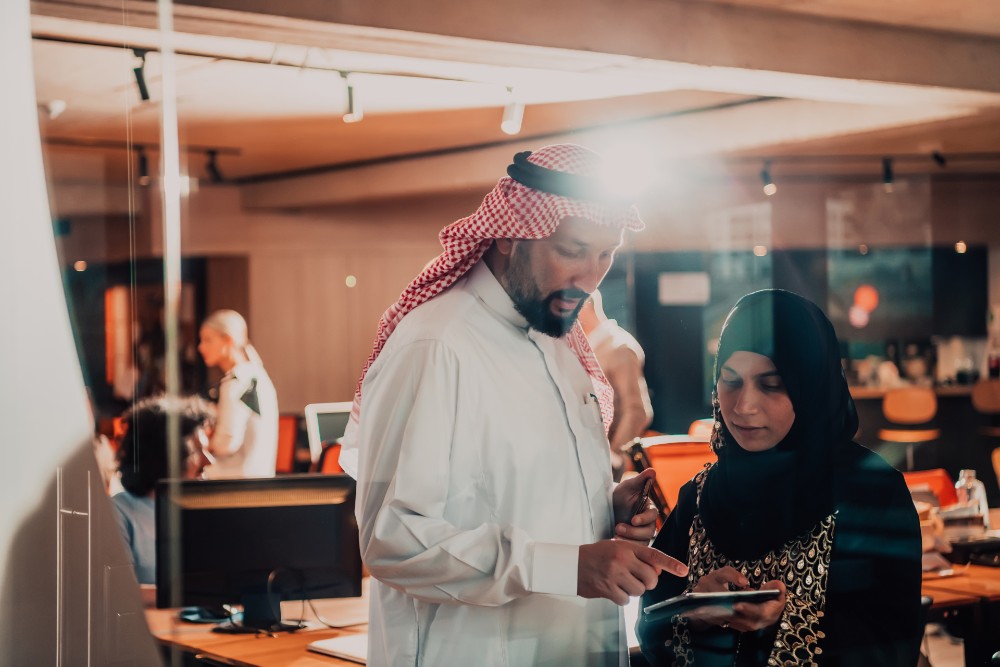BAHRAIN

Form of Government: Constitutional Monarchy
Surface:
786.5 square kilometers land area
7.482.5 square kilometers territorial water area
Population: 1.540.558
Capital: Manama
Monetary unit: Bahraini Dinars (BD)
Languages: Arabic (Official), English is widely spoken
Time: GMT +3
ECONOMY
Along with competitive costs, easy access to the rest of the Middle East, and a well-established business infrastructure, the Kingdom of Bahrain has a track record as a business-friendly investment location. Bahrain considers foreign investment as a key aspect of its Economic Vision 2030, its long-term plan to improve economic competitiveness; through which, job creation is catalysed and living standards are enhanced. For this reason, Bahrain is committed to building on its existing advantages, aiming to become one of the Middle East’s most attractive centres for business.
Economic vision 2030
Bahrain’s Economic Vision 2030 was launched in October 2008 by His Majesty King Hamad Bin Isa Al Khalifa. It embodies a comprehensive vision that aims to strengthen and diversify the Kingdom’s economy while improving the living standards of its population. The vision was launched following four years of in-depth discussions between representatives of both the public and the private sectors, along with several think tanks and international institutions. After the launch of the vision, the Kingdom began an institutional economic reform program to achieve the vision’s set objectives. This led to the preparation of a national economic strategy that represents a roadmap to achieve the vision. The guiding principles of the vision are: sustainability, competitiveness, and fairness.
The Economic Recovery Plan
The Economic Recovery Plan is a national economic growth and fiscal balance plan. The multi-year plan represents one of Bahrain’s largest economic reform programmes, with the aim of enhancing the economy’s long-term competitiveness and supporting the post-COVID 19 recovery. The plan aims to realise fiscal stability and drive economic growth through five key priorities that will contribute directly to the GDP, generate investment opportunities and provide quality jobs and opportunities for Bahrainis. These include: catalyzing US$30 billion major strategic projects; generating 20,000 quality jobs for Bahrainis and upskilling 10,000 Bahrainis annually for the next two years; achieving economic stability and fiscal sustainability by 2024; simplifying and increasing efficiency of commercial procedures; and developing strategies for priority sectors to grow the non-oil GDP by 5% in 2022 in the tourism, logistics, manufacturing, telecom, IT, digital economy and oil sectors.
Sustainability
A considerable share of the country’s growth over the last two decades was driven by the public sector. Bahrain seeks to diversify its economy and create a market that can more readily compete in the global economy. Bahrain aims to have the private sector drive economic growth independently by 2030. Government finances will adhere to the principle of sustainability, upholding a system that is stable and forward-looking. Bahrain will use its resources to invest in the future, improving its human capital through education and training, particularly in the field of applied sciences. In a world where modern technology and new competitors from across the globe are continually shortening product lifetimes, entrepreneurship, and innovation will ensure the sustainability of a vibrant private sector. Nonetheless, economic growth must never come at the expense of the environment and the long-term well-being of Bahrainis. No effort will be spared to protect Bahrain’s environment and preserve the Kingdom’s cultural heritage which includes three UNESCO World Heritage Sites. Bahrain has also set a target to achieve net-zero carbon emissions by 2060.
Competitiveness
Bahrain aims to attain a high level of competitiveness in the global economy. Increased productivity comes about naturally in a competitive environment, driving further economic growth, profitability, and wages. Only high and continuously improving productivity will enable businesses to increase their employees’ wages. Higher productivity requires people with the right skills for each position. Bahrain is already home to one of the most-skilled and highly educated workforce in the region, with plans to further upskill and train Bahrainis to be the employees of choice whilst building the human capital advantage, especially in technology and emerging skills.
The Kingdom also strives to become the ideal investment destination for both local and foreign companies. Bahrain offers the region’s best-value operating costs, up to 45% more cost effective than the rest of the region, supported by forward-looking regulations with 100% foreign ownership offered in most business sectors. Other factors that make Bahrain attractive to investors in high-value-added industries include high-quality public services, a cutting-edge infrastructure and an appealing living environment.
Fairness
The country’s future economic success will impact society more widely, creating a broad base of prosperity. Every individual can make a worthwhile contribution to society, given the means and the opportunities.
For fairness to be nurtured, all transactions made by both the public and private sectors must be transparent. Free and fair competition should prevail, with private and public activities taking place in the open, whether they concern employment, land for public auction or the outcome of a tender.
The Government of Bahrain is committed to providing the legal and regulatory framework that ensures the protection of consumers and fair treatment for business owners – including foreign investors.
This means stamping out any opportunity for corruption and seeing that laws are justly enforced. Fairness in society means that all are treated equally under the law, that all people have equal access to public services, and have their rights protected without discrimination.
These three guiding principles are in line with the global Sustainable Development Goals 2030 (SDGs). High economic growth, government finance, improving human capital, fairness, and a highly competitive market will lead to achieving most of the SDGs. These goals are considered as part of the government’s current priorities and remain linked to the executive actions of the Government Program.
Taxation
With no corporate, income, withholding tax, capital gains or wealth taxes and no inheritance taxes or death duties, Bahrain is one of the most tax efficient business bases in the region. Bahrain is renowned as a “Business Friendly” liberal society; open-minded and actively encourages private enterprise.
Leading the region in supporting private enterprise, Bahrain was the first GCC country to discover oil in 1932, yet the first in the region to diversify its economy. Bahrain’s non-oil GDP is already in excess of 80%. Bahrain is actively encouraging private sector growth by allowing 100% foreign ownership in most business sectors and repatriation on income. The Kingdom is effectively one massive Free Zone.
Bahrain’s strategic geographic location also offers unparalleled access to the region. Major centres including Riyadh, Kuwait, Abu Dhabi, and Dubai are an hour’s flight time away. Consequently, access to every market in the Middle East is quick and efficient – by air, sea and road.
It’s not all about location, it’s also about the people. Bahrain has a highly developed workforce largely due to organizations like Tamkeen that identifies “skill gaps” in the market then invests in training Bahrainis to gain the expertise to meet market needs. In the financial services sector alone, two-thirds of employees are Bahraini.
Sources: Bahrain Financial Harbour, Economic Development Board, The Information & E-Government Authority
GOVERNMENT
Bahrain is a constitutional monarchy and governing is based on the separation of legislative, executive, and judicial authorities and their cooperation under the provisions of the Constitution.
The Kingdom of Bahrain is a fully sovereign, independent Islamic Arab State whose population is part of the Arab nation.
The system of government in the Kingdom of Bahrain is democratic, sovereignty being in the hands of the people, the source of all powers.
Citizens, both men and women, are entitled to participate in public affairs and enjoy political rights, including the right to vote and to run for elections, in accordance with the Constitution.
Rule of law and independence of the judiciary
The Rule of Law is a central aspect of the Bahraini Constitution.
The independence of the judiciary is a key guarantee for protecting rights and freedoms.
Individual freedoms, justice and equal opportunity are core principles of the society.
All citizens are equal before the law in terms of rights and duties, without distinction of race, origin, language, religion or belief.
Punishment is individual. An accused person remains innocent until convicted in a fair trial in which all guarantees are provided, ensuring that an accused individual is afforded the right of defence throughout the investigation and prosecution under the law.
Places of residence are inviolable. Unless authorized by its legal occupants, no place of residence shall be entered or inspected.
Freedom of belief, expression and publishing:
The state ensures freedom of belief, maintains inviolability of houses of worship and guarantees freedom to practice religious rites according to the custom of the land.
Every citizen has the right to express himself, in writing or in any other way of expression of opinion or creativity. Freedom of scientific research, publishing, press and printing are ensured within the scope specified by the law.
Source: Ministry of Foreign Affairs
CULTURE
The Kingdom of Bahrain holds a unique place due to its geographical location in the Arabian Gulf and its deep-rooted history of ancient civilizations. Both elements have blessed it with a liberal and tolerant cultural heritage, making it throughout the ages, a safe home for ethnically diverse inhabitants.
Bahrain is thus distinguished by its rich history and heritage that span more than 5,000 years. Its pluralistic identity and its contributions to the world’s civilizations have made it a shining cultural and intellectual centre and an oasis of tolerance and peaceful coexistence among societies and religions.
Bahrain enjoys an excellent regional and international reputation with regard to its efforts that aim to affirm regional and global peace thanks to the pioneering initiatives of His Majesty King Hamad bin Isa Al Khalifa. In 2015, the Bahrain Authority for Culture and Antiquities (BACA) was established as the relevant authority in charge of preserving Bahrain’s archaeological history, heritage and to represent Bahrain abroad and further enhance its cultural achievements.
BACA carries out all the tasks related to the protection and development of culture, national heritage, antiquities, and museums as well as to encourage art and theatre activities. BACA also aims to promote the Kingdom’s deep-rooted history and rich cultures by organizing annual festivals, cultural events, intellectual forums and artistic workshops.
Source: Ministry of Foreign Affairs Youth and Sports
The youth and sports movement in the Kingdom of Bahrain witnessed a recent surge in different areas. There are 36 youth centres providing 867 different programs for 50,000 members.
EDUCATION
History
Quranic schools (Kuttab) were the only form of education in Bahrain at the beginning of the last century. They are traditional schools aimed at teaching children and youth the reading of the Holy Quran.
1919 marked the beginning of the modern public school system in Bahrain. Al-Hidaya Al-Khalifia school for boys was established in the northern tip of Muharraq. The first Committee of Education consisted of several leading merchants and was presided over by the late Shaikh Abdulla bin Isa Al-Khalifa who was popularly known as ‘the Minister of Education’.
He was also responsible for the management of Al-Hidaya school. In 1926, the Education Committee established the second public school for boys in Manama. In 1928 the first public school for girls was established in Muharraq. Due to the financial and administrative difficulty faced by the Education Committee, the schools came under the direct control of the government in 1930.
History education since childhood
The Kingdom of Bahrain has always been keen to educate generations starting from the first stages of childhood to preschool. The Ministry of Education supervises nursery schools and kindergartens.
Basic and secondary education
Basic education is divided into two stages: the primary stage which includes the age groups of 6-12 years; the duration of the program is six years. Middle School (preparatory) includes pupils between 12-14 years of age and is for three years. High School (secondary level) prepares students for universities and higher educational institutions or to engage directly in the labour market. The program lasts for three years, divided into six semesters (three levels). The credit hours system, which offers a wide range of courses, allows students to alter their studies to suit their future goals.
Private Education / Non-Governmental
The Department of Private Education in the Ministry of Education supervises private educational institutions. This department coordinates with other departments of the Ministry, providing technical support and assistance to all private educational institutions such as helping in finding teachers, providing textbooks for the Arabic language, Islamic education, and the history and geography of Bahrain. It also allocates specialists from the Ministry to guide the teachers regarding the above-mentioned materials. The private educational institutions include different types of kindergartens and private schools, which are divided into national and international schools and communities.
Special education
The Ministry of Education is responsible for identifying learning-disabilities in schools and supervising students with special needs in both public and private schools in the Kingdom.
E-learning
In 2004 His Majesty King Hamad bin Isa Al Khalifa inaugurated the “Schools of the Future” project based on the use of information and communication technology to support basic and secondary education in the Kingdom, aiming to connect all schools in the Kingdom through the Internet and introduce the concept of E-Learning.
Source: Ministry of Foreign Affairs, Ministry of Education
ENVIRONMENT
Bahrain is committed to protecting the environment and preserving natural resources while pursuing its ambitious national development agenda. The Kingdom has made significant progress in these areas, incorporating the Sustainable Development Goals 2030 (SDGs) set by the United Nations General Assembly into its Government Program and Economic Vision 2030.
Sustainability is one of three principles guiding Bahrain’s Economic Vision 2030, which focuses on a range of issues, including the environment, sustainable resource management, urban development, water and energy, transport, urban growth, waste management, marine conservation, and biodiversity, among others.
The Kingdom has established several governmental institutions, organizations, and committees to develop programs, policies, and strategies to achieve sustainability in its various dimensions. It has also enacted several laws and regulations related to the achievement of sustainable development.
Bahrain has also signed multilateral agreements related to sustainability and continues to meet its commitments to them.
Preserving the environment
The Kingdom of Bahrain places the protection of the environment, natural resources, and biological diversity at the forefront of its development priorities. The government of Bahrain has strengthened its efforts in preserving the environment aligning it with the government program, which emphasizes achieving environmental sustainability, improving the efficiency of resources and energy, establishing mechanisms for environmental impact assessment for economic projects, and encouraging Production, use and investment of renewable energy.
The Kingdom is working towards enhancing the role of the private sector in recycling plastic waste to preserve the environment by providing recycling sorting containers in several public and private locations with the aim of awareness and encouragement for safe disposal of plastic.
Bahrain is keen to dispose of all types of waste in an environmentally safe manner by carefully managing the waste generated from the industrial sector, and hazardous waste from other sectors in accordance with the provisions of local legislation and international agreements, and in accordance with the international obligations of the Kingdom of Bahrain in the sector of environmental preservation.
The Supreme Council for Environment (SCE) in Bahrain is a government entity in charge of the development of Bahrain’s future strategy for the environment and sustainable development. It also follows up on the implementation of this strategy with relevant ministries, agencies, and institutions. The SCE’s mandate includes protecting Bahrain’s natural habitat and human environment, ensuring the sustainability of its components, and preserving and developing its resources for future generations.
Joint National Committee on Climate Change
Since 2007, the Joint National Committee on Climate Change has overseen all climate issues in Bahrain. Today, the committee is chaired by the Supreme Council for Environment and includes members from the National Oil and Gas Authority, the Ministry of Industry and Commerce, the Ministry of Electricity and Water Affairs, the Ministry of Transportation and Telecommunications, Civil Aviation Affairs, the Ministry of Foreign Affairs, and the Bahrain Economic Development Board.
The committee discusses and takes decisions on all activities, projects, and programs related to climate change in Bahrain, including mitigation and adaptation measures, monitoring, and following up on the latest international developments, forming national positions and submissions to international climate agreements. It also works to ensure balance and integration between climate change commitments with the economic and social needs of Bahrain’s sustainable development.
HEALTHCARE
Primary healthcare
Primary healthcare services through public and private healthcare providers are the foundation of Bahrain’s healthcare system, one of the region’s most advanced. Healthcare is free of charge for Bahraini citizens at government hospitals and health centres across all governorates, and available for a nominal fee for non-Bahrainis. Under the new National Social Health Insurance Program (Sehati), Bahrainis will receive free health coverage from the government, while expatriate employees are covered by their employers.
Bahrain Embassy information note
Informative note special edition 21
November 2023
Informative note special edition
September 2023
Informative note N.22
May 2023
Informative note N.21
Aprile 2023




